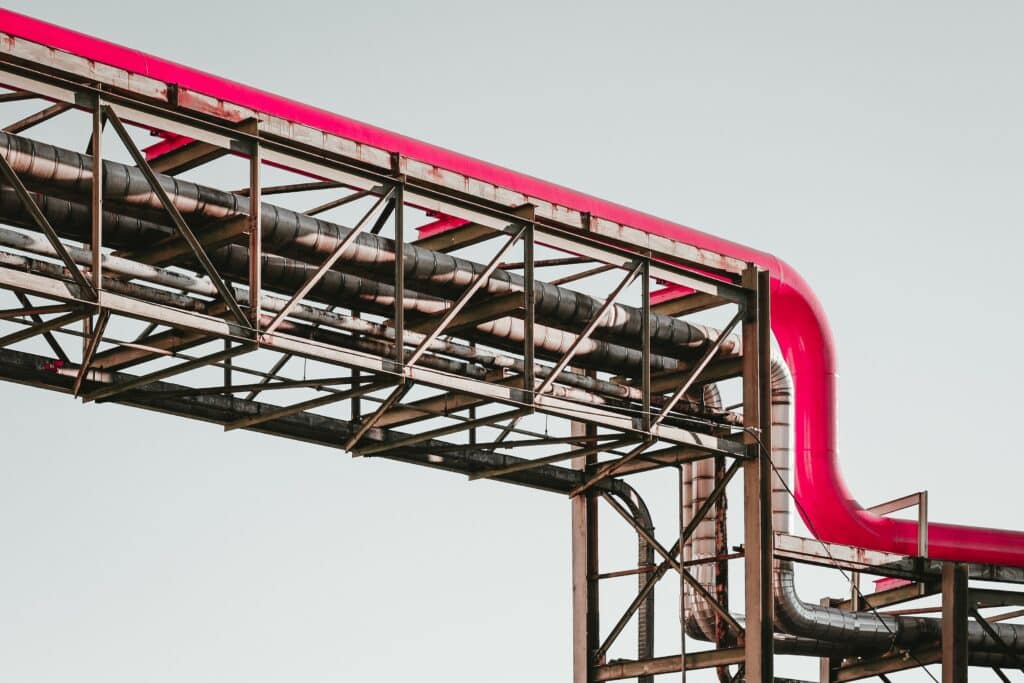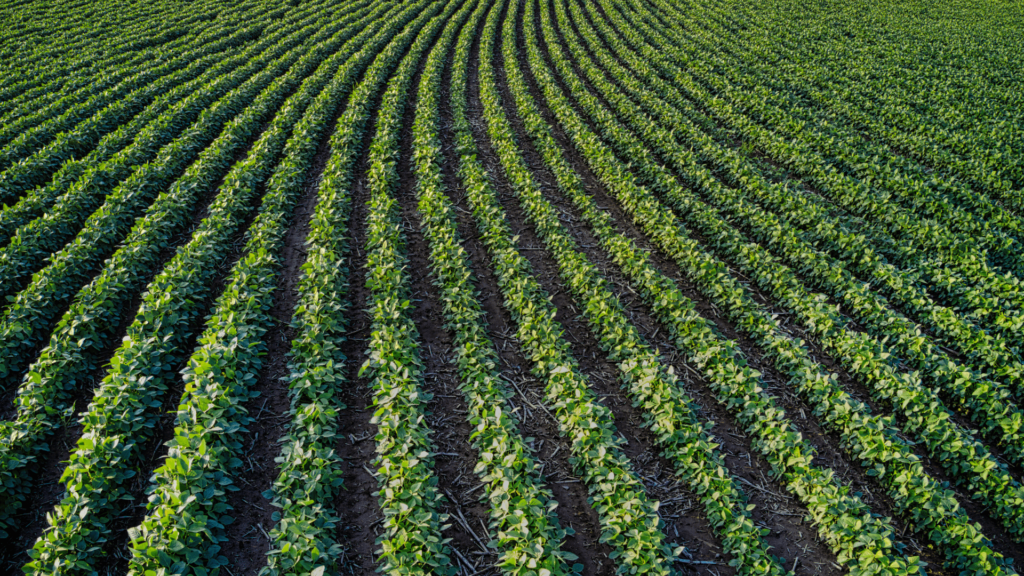Lessons learned from the crisis: insights on three newly introduced EU emergency gas measures
Highlights from the online FSR Insight: Experience with emergency gas measures - price cap, storage and saving regulations.
When the current energy emergency hit Europe, natural gas and electricity prices spiked.
The reduction of Russian gas imports to almost zero came on top of a situation that was already tight due to several factors. There were relatively low wind conditions, there was a drought that affected hydropower and an unusually large number of nuclear units were unavailable, and finally, gas storage levels were at a 10-year low filling level.
To cope with all of this, the European Commission proposed several emergency measures both on the supply and demand side. Some were directly related to natural gas: price cap, storage filling levels and burden sharing, and demand-reduction measures (see Fig. 1).
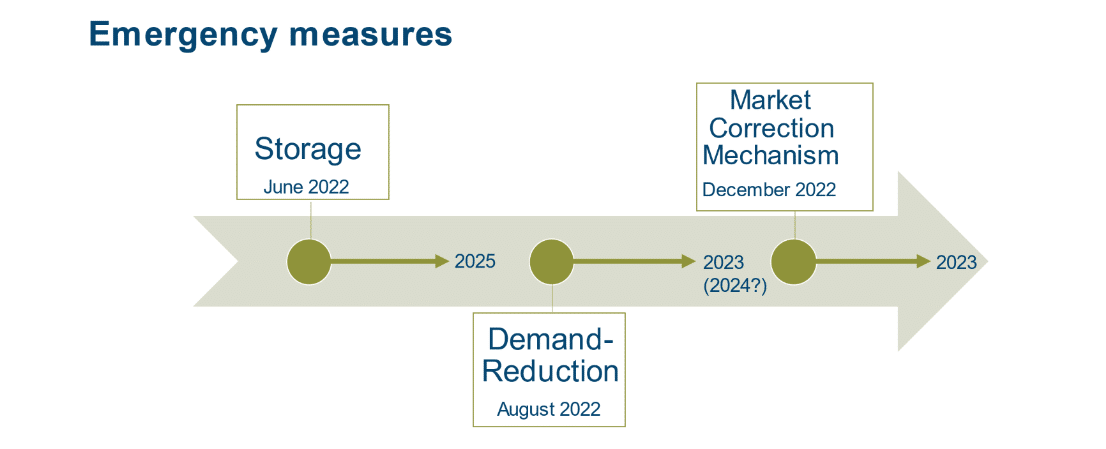
This episode of FSR Insights brought together academics from different European institutions to discuss these three newly introduced emergency measures with the audience and debate whether they were and are still fit for the purpose.
1. Emergency gas price cap or “market correction mechanism”
An overview of the main elements of Regulation (EU) 2022/2578, which in December 2022 put forward a market correction mechanism to protect EU businesses and households from episodes of excessively high gas prices in the EU, was given to the audience, which was then asked to give its opinion on the measure (see Fig.2)
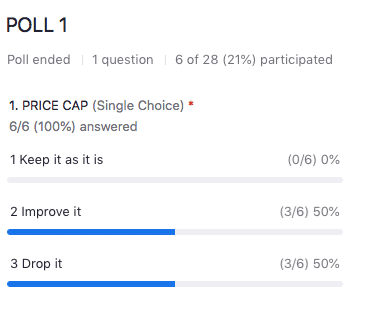
Most of the audience refrained from voting, which suggests that it is not a straightforward question to answer. However, the few that did answer were either against the cap or would like to improve it.
Even though some academics argued in favor of a gas price cap (in combination with saving measures), the panel mainly put forward arguments for dropping the cap:
- There is a distinction to be made between the pricing mechanisms and the price levels. Problems have been around the price levels, and the answer has been to change the price mechanisms. The response has been to constrain what we have been trying to do in Europe for the past 20 years with the liberalization of the market.
- Price is a signal for the scarcity of volumes. Hence, if natural gas is scarce, it is essential that the price signal works appropriately. If we lower the price with a cap, then we might not be able to meet demand, because scarcity is not signaled correctly.
- The measure looks at Europe as a whole market but does not consider the differences among Member States. New or different technical implementations/ benchmarks should be used in case there are different levels of scarcity within Europe.
2. Emergency gas storage regulation
The debate moved to the new storage regulation measure. An overview of the main elements of Regulation (EU) 2022/1032, which in June 2022 introduced measures to deal with the market imbalances for energy and to ensure well-filled gas storage in the EU amending the existing regulation on security of supply (Regulation (EU) 2017/1938), was given to the audience, which was then asked to give its opinion on the measure (see Fig.3).
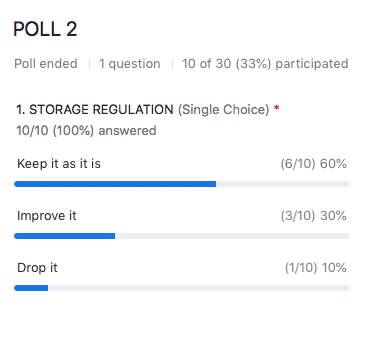
A few more participants felt comfortable answering this question. Most agreed with the introduction of storage filling obligations and burden sharing among Member States, and several think we can improve this regulation.
Some of the main points highlighted by the panelists related to the poll were:
- Storage has a high insurance value within the system, but additional empirical analysis is needed to understand whether the regulation contributed to the price spike.
- It is crucial to find some mechanisms that address the solidarity question. Although the burden-sharing measure is very challenging, it is nonetheless an important first step in this direction.
- Introducing more gradual replenishment targets in the filling obligation timeline could help reduce price spikes and improve market flexibility.
3. Emergency gas demand reduction measures
Finally, an overview of the main elements of Regulation (EU) 2022/1369, which in August 2022 advanced coordinated demand-reduction measures for gas to reduce gas use in Europe, was delivered to the audience, which was again asked to give its opinion on the measure (see Fig.4).
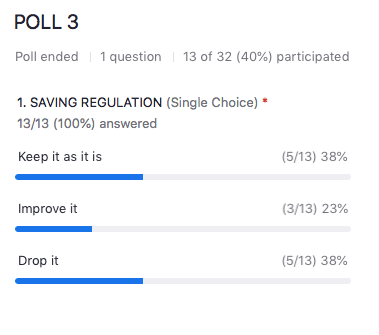
The poll showed a more split audience. Even though the majority wanted to keep it as it is or to improve this emergency measure, there was also a significant group that wanted to drop it.
Some of the most critical aspects expressed by the panelists were:
- The demand side is the one thing we have control over as an importer, so it is crucial to regulate it, especially considering that forecasts are indicating an increase in gas demand in 2023 in Europe in the main consuming sectors (i.e., industry, residential, and commercial).
- Although governments are trying to exert a long-term influence on demand, how provisions on security of supply should more technically be spelled out and what could be tools in a real emergency situation is been clarified because unlike in the past, the current crisis is long-lasting.
- Not only it is important to understand “why” demand is reduced, but also “how” should be deeply examined.


